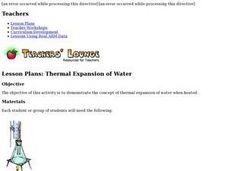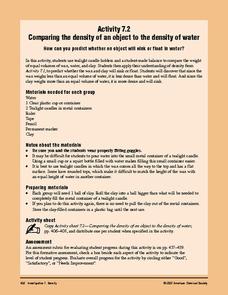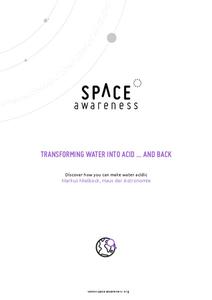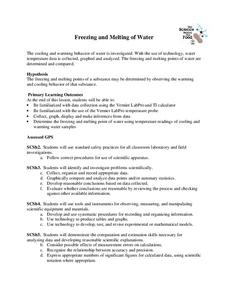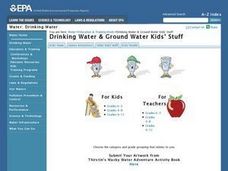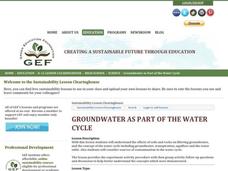American Chemical Society
The Water Cycle
Bring the water cycle into the classroom without the mess. Learners build a model of the water cycle using everyday materials. They observe the process of evaporation and condensation and relate their observations to the larger scale...
US Department of Energy
Thermal Expansion of Water: Rise of Sea Level
Using bunsen burners, Erlenmeyer flasks, thermometers, hollow glass tubes, stoppers, and rulers, learners experiment with and measure how water expands when heated. The activity connects the expansion of water when heated to global...
Michigan Sea Grant
Water Quantity
It may be tricky for a young mind to conceptualize that less than 1% of all water on earth is useable for humans to drink. Simulating the amount of fresh water available on earth by removing measured amounts of water from a five-gallon...
American Chemical Society
Can Gases Dissolve in Water?
Why does soda fizz when opened? Learners discuss the appearance of bubbles in soda bottles when opened. In groups, they design and complete an experiment comparing the amount of carbon dioxide dissolving in cold versus hot liquids.
American Chemical Society
Comparing the Density of an Object to the Density of Water
Investigators construct a makeshift balance and compare equal volumes of wax and water. They do the same for clay and water. Then they discover whether the wax and clay will float or sink in water. Ultimately this is a comparison of...
Foundation for Water & Energy Education
How Can Work Be Done with Water Power? Activity A
Environmentally friendly engineering teams construct a water wheel and experiment with its speed and the resulting amount of weight it can lift. Consider following this activity with two more of the same title by the same publisher when...
NASA
The Case of the Wacky Water Cycle
Join the tree house detectives in learning about the processes of the water cycle, water conservation, water treatment, and water as a limited resource.
Space Awareness
Transforming Water Into Acid ... And Back
Greenhouse gases affect marine wildlife in life-threatening ways. Through experimentation, your classes explore the acidification of water from the main greenhouse gas carbon dioxide. As they introduce carbon dioxide to water, a pH...
Center for Learning in Action
Water—Changing States (Part 1)
Here is part one of a two-part lesson in which scholars investigate the changing states of water—liquid, solid, and gas. With grand conversation and up to three demonstrations, learners make predictions about what they think will happen...
University of Georgia
Freezing and Melting of Water
Examine the behavior of energy as water freezes and melts. An engaging activity provides a hands-on experience to learners. Collaborative groups collect data and analyze the graphs of the temperature of water as it freezes and then...
San Francisco Public Utilities Commission
Water from the Well
How much water does it take to brush your teeth? How about to wash your clothes? Perform an experiment that measures water usage in everyday tasks and compares them to the days before indoor plumbing, specifically the California gold...
Bowland
Water Availability
Just how scarce is water in different parts of the world? Through these water lessons, young data analysts use provided data to investigate the scarcity of water in countries of the Middle East and Africa. They use ratios and rates to...
California Academy of Science
Sustainable Water Solutions: Weighing the Pros and Cons
Switching indoor water fixtures to low flow reduces water usage by more than 45 percent. This and other solutions to reduce water usage have both pros and cons. Scholars view videos of different solutions, discuss them in small groups,...
California Academy of Science
Your Hidden Water Footprint: Defining a Problem to Find a Solution
One 17-ounce bottle of Cola requires around 46 gallons of water to produce. How is that possible? Young scientists learn about the hidden water used to produce everyday items. They research, discuss, and look for ways to reduce water...
National Park Service
Glaciers and Water
Explore the amazing power of glaciers with a hands-on earth science experiment! After first learning basic background information, learners go on to create their very own chunks of frozen water and gravel in order to observe first-hand...
NASA
Water Rocket Construction
What are the basics for building a rocket out of a two-liter bottle? The procedures outline the basics to create an air- and water-powered bottle rocket. Prior to launching the rockets, teams perform safety checks to ensure their designs...
Curated OER
Ecosystem Services - Water Purification
Students see that ecosystems provide services to people that are essential to life as we know it. Reporters (drops of water) could interview the trees and soil in the surrounding ecosystems for news stories on how they helped keep the...
Curated OER
Importance of Water
Students complete a KWL chart on what they comprehend about water. They complete a water activity determining how much usable water is available, and they determine the water usage in their households. Students take notes on water and...
Curated OER
Youth Activity: How People Get Their Water Reservoirs: "Holding Tanks" for Drinking Water
Students experience and participate in "Riding the Water Cycle" with this lesson. They explore, analyze and study the role of reservoirs in maintaining a reliable supply of drinking water. Each student constructs a model of a reservoir.
Curated OER
Water Around Us
Students create a collage of human land use activities around a body of water. Students evaluate the effects of different kinds of land use on wetland habitats, and create a list of pros and cons for each land use.
Curated OER
Groundwater as Part of the Water Cycle
Make sure to read through the activity procedures thoroughly before teaching this lesson because the materials list is incomplete. Also, the mentioned worksheets and booklet are not available. However, there is no need to discard this...
Curated OER
Amazon Water Cycle Role Play
Students participate in a role play where they play clouds, the ocean, rain drops, and more in order to learn about the water cycle. In this water cycle lesson plan, students have discussions and learn vocabulary.
Curated OER
Snapshot Day Definitions and Activities
Here is a document full of teaching notes on water quality and bodies of water that you can use in your ecology curriculum. It has information specific to the Hudson River area, but can easily be adapted to any local body of water....
Curated OER
Water and Ice
Students explore water and how it changes forms. In this investigative instructional activity students participate in an activity that shows them how water changes form and what it looks and feels like.
Other popular searches
- Water Cycle Activities K
- Activities on Water Sources
- Water Cycle Activities 3d
- Sand and Water Activities
- Pre K Water Activities
- Saving Water Activities
- Running Water Activities
- Recycled Water Activities
- Junior Water Activities
- Ocean Water Activities
- Prue K Water Activities
- Ocen Water Activities



